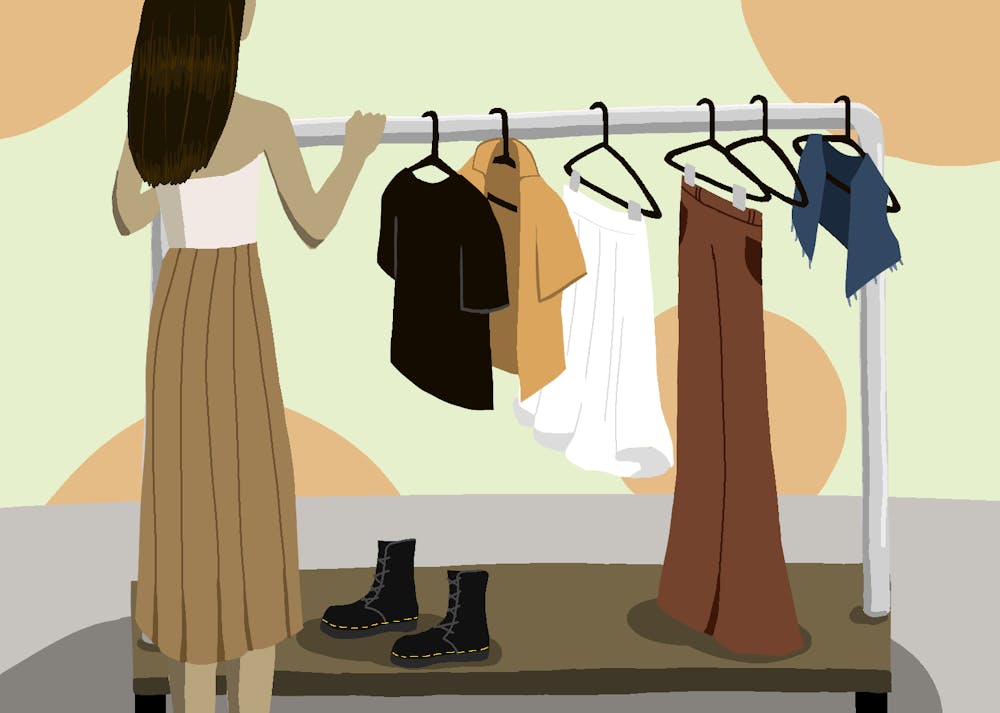It's a common scene Yasu Hashino, the owner of Ghost Vintage, a store 10 minutes away from ASU's Downtown Phoenix campus, sees nearly every day: Two girls enter, and as they browse clothing for sale, one begins to doubt the pieces will look good on her.
And every time, Hashino wants to tap them on their shoulder and let them know they look good. "Confidence. Fashion is confidence," Hashino said. "Clothes make you have a different attitude. So use it. Use it to make you brighter."
Finding out what you're confident in can lead you to a closer understanding of who you are. Luckily for ASU students, there are a variety of vintage clothing stores near the school's campuses where students can find new ways to express themselves.
What's the difference between vintage and thrifted?
Most of the store owners who spoke to The State Press unanimously agreed on one thing: Vintage is distinct from thrifting.
Age and quality are defining factors of vintage. Vintage is meant to hold up for the long run. Hashino references modern-day clothes as "IKEA shit," as both are similarly mass-produced and "will only keep you happy for the next three months."
"Vintage is about quality," Hashino said. "I don't feel tempted in the mall because all companies do is run after profit. They don't go for creativity, quality or timelessness."
Thrift stores can have newer, mass-produced clothes, unlike vintage stores. For David Dawson, owner of Tempe Throwbacks, he's only been in a thrift store once: "I needed to go in for the restroom."
Downtown Phoenix
Antique Sugar is "colorful, quality and procured," said Annamarie Sanchez, owner of the shop.
The earliest decade Antique Sugar sells from is the early '90s. When curating items to include in their shop, Antique Sugar looks for craftsmanship.
How "it comes all the way down to a hemline, how something is stitched," said Jasmyn Adcox, manager of Antique Sugar, are key things she looks for.
A lot of people who go into Antique Sugar don't realize you can wear vintage, Sanchez said.
A lot of customers who go to Antique Sugar are not just looking to buy, but to have an experience. "We get a lot of 'fashion show' kind of groups who come in and they just want to try things on for the fun of it," Sanchez said.
For Adcox, personal style comes from staying "unique to yourself. Don't fall into trends because they come and go. They're called trends because they're so momentary."
During her childhood, she felt out of place dressing in vintage as it wasn't her choice. "I grew up pretty poor. And so my wardrobe was mainly my grandma's closet," Adcox said.
But when Adcox got older and was financially able to support herself, she tried to fit the mold of what others wore. "I worked at Anthropologie and I tried to be that artsy-fartsy creative college girl at fashion school. But it wasn't me. I felt like a poser. I felt so unoriginal."
Wang's Vintage is "authentic, multicultural," said Noah Vizzerra, manager and curator of the shop.
Wang's Vintage sells clothing from the late '60s through the early '90s. Vizzerra elaborates on the age and timelessness of the clothes, saying, "the energy with some of these items is almost supernatural."
Wang's Vintage has $10 Saturdays where they put out bins of $10 shirts. Typically, prices range from $20 all the way to $2,000 for collector art pieces.
"I look and I touch every single shirt that goes out (in the store)," said Vizzerra. "So most of it is from Arizona. But I mean here and there I've definitely ordered things online from overseas."
Vizzerra said some customers go in looking to collect rare pieces of clothing valued as art.
"I don't know it's more than just fashion. It's like collecting too," Vizzerra said. "Even if you're not wearing it, you're happy to just have it."
Unlike Antique Sugar's belief in originality, Vizzerra said, "so many people want to be original, but originality doesn't exist anymore."
"Everyone likes to gatekeep," Vizzerra said. "Like 'this is mine' and they get mad if somebody's doing something they're doing. But, in the world, I feel like everything is imitation, and then you add your own little flair to it."
Tempe
Buffalo Exchange is "fun, eclectic and vintage," said Aarian Fyre, marketing specialist at Buffalo Exchange. It's the closest thrift and vintage store to the Tempe campus as it's only two miles away.
Although Buffalo Exchange, a chain store, sometimes carries vintage items, they are predominantly a thrift store.
"We aim to keep a balance of classic wardrobe staples, current trends and one-of-a-kind vintage," Fyre said. "With the exception of vintage, those styles often reflect what you can currently find online or in person at the mall or a department store."
What makes Buffalo Exchange unique among other thrift stores is that the majority of their inventory comes from buying from walk-in sellers, said Fyre.
"We believe that buying is an art and not a science, so we don't use a computer system," Fyre said. "Plus, as your style evolves, you can always clean out your closet and trade in the things you're no longer wearing for store credit to spend on new pieces you'll love."
You can sell your clothes for cash or trade. Sellers receive 25% back in cash of the price store employees set or 50% in a store credit that never expires.
Tempe Throwbacks is "retro, subtle," said Dawson.
Tempe Throwbacks, roughly three miles from the Tempe campus, carries sports jerseys, shirts and hats. These sports include baseball, basketball, football, and hockey. Occasionally he carries soccer, boxing, UFC and NASCAR wear.
Items range from $10 to $150 at Tempe Throwbacks and Dawson said every customer always walks out with a discount.
"That's just another thing that builds rapport and just a happy customer," Dawson said. "You can see so many happy customers just genuinely happily shopping in my store, and I love them and I pride myself on how we've really built an amazing community here. They love me and more importantly I reciprocate that love to them. It's a beautiful thing."
Edited by Jasmine Kabiri, Wyatt Myskow, Grace Copperthite and Piper Hansen.
Reach the reporter at sfan32@asu.edu and follow @moopy_shoepee on Twitter.
Like The State Press on Facebook and follow @statepress on Twitter.
Sherry Fan is a journalism student hoping to educate audiences on underrepresented communities. She has previously worked producer roles for the film company, Summery Productions.




